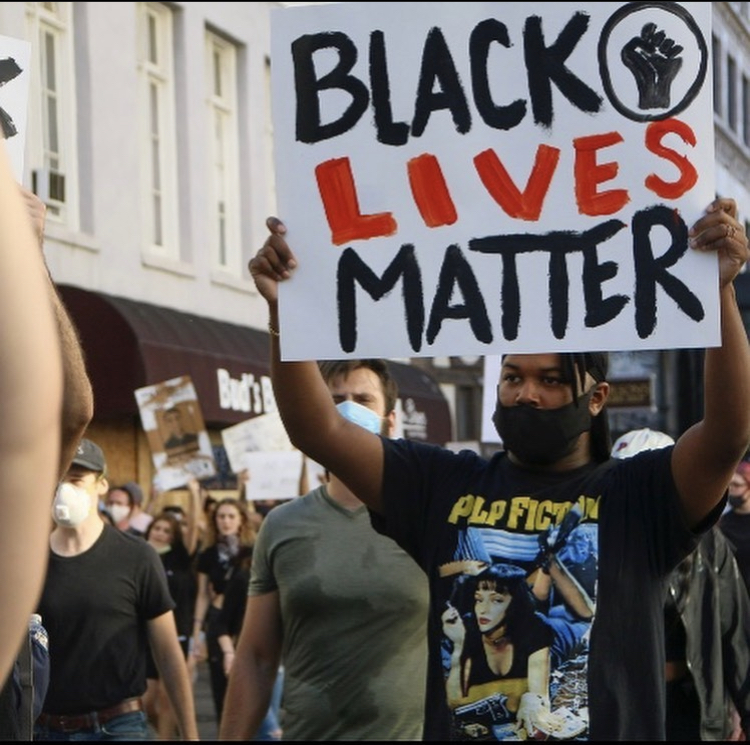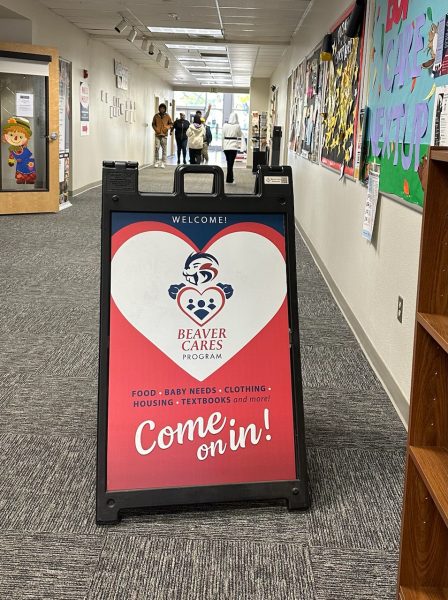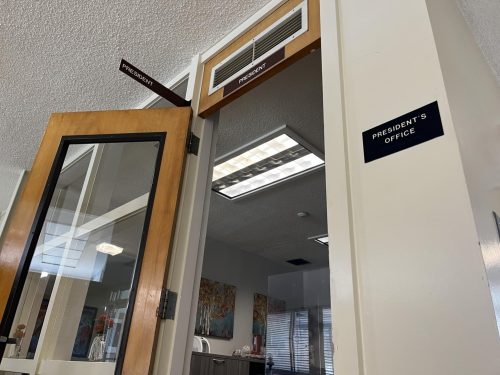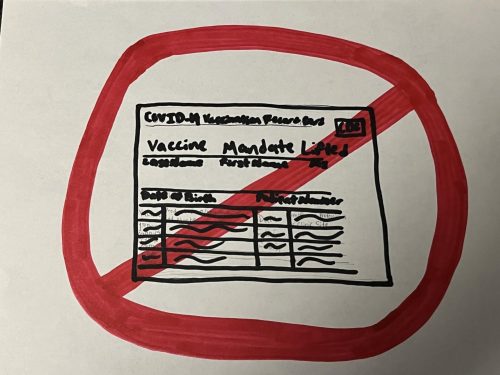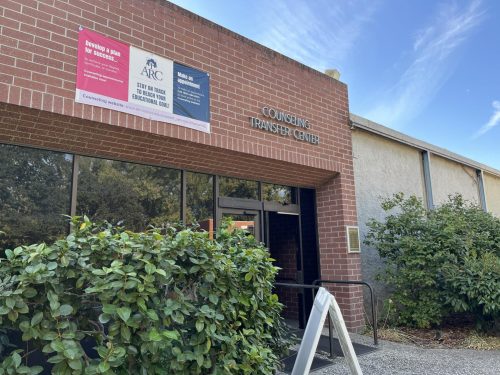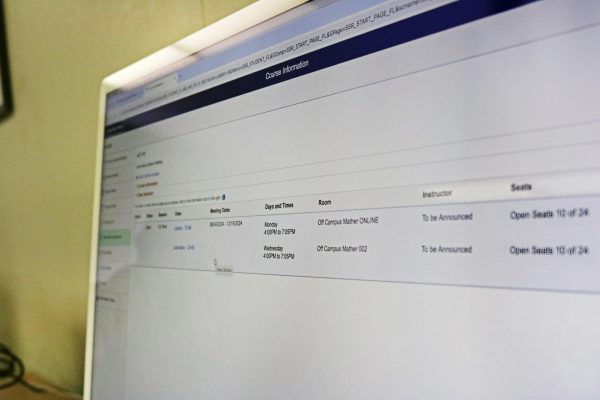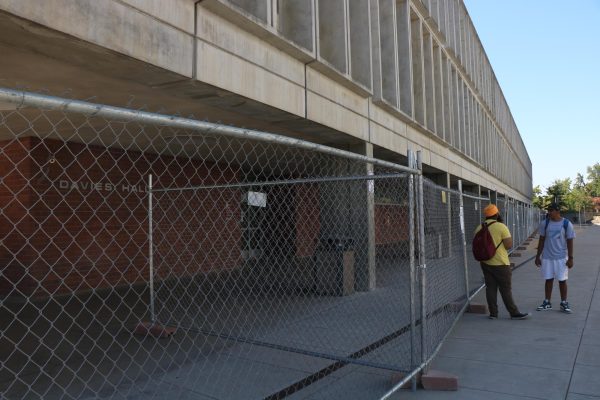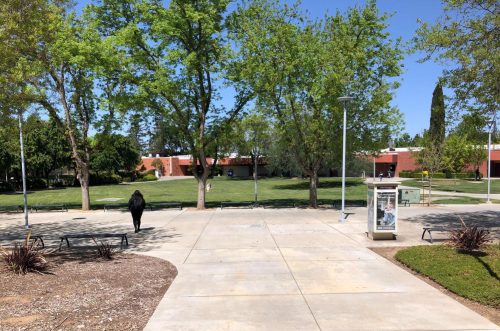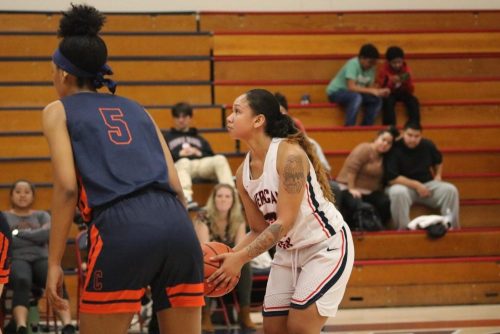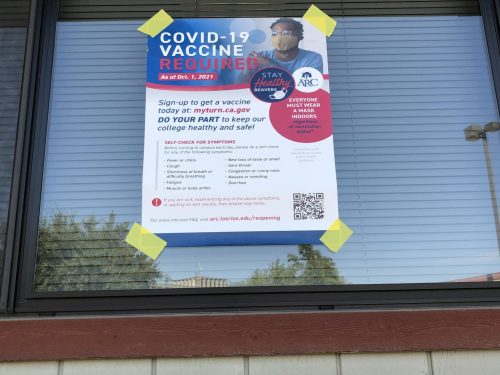Editorial: LRPD needs more than reformation, it needs total reimagination
Racism cannot be removed from a racist system; Defund the LRPD
Over the summer people flooded into Cesar Chavez Park in Sacramento over the course of weeks to protest the killing of George Floyd and police brutality across America. The Black Lives Matter movement and message has been at the forefront of these protests demanding justice, accountability, and national defunding of the police. (Photo by Emily Mello)
The summer of 2020 was one most of us will likely never forget. In the wake of the COVID-19 pandemic, the world stopped when George Floyd was killed after Minneapolis police officer, Derek Chauvin, knelt on his neck for eight minutes and 46 seconds as he pleaded and gasped, “I can’t breathe.”
This was not the first nor was it the last unjust killing of a Black person by law enforcement in America. Breonna Taylor was shot only weeks later by plainclothes Louisville police officers during a botched drug raid in which the suspect had already been found and apprehended by the time shooting occurred, according to the New York Times, which covered Taylor’s case in August.
Both Floyd and Taylor’s deaths, among many other cases of wrongdoing to Black lives, led to a worldwide outcry in the form of protests, primarily lead by Black Lives Matter, calling for police reform, defunding/demilitarization and reinvestment in communities, as well as leaving people with fear and distrust for law enforcement.
The Los Rios Community College District (LRCDD) has been planning its response to this social eruption since almost immediately after the protests began but was slow to share its answers and did not address the call outs of BLM by choosing not to move forward with a plan to defund or demilitarize the Los Rios Police Department (LRPD).
With the tensions that have been built up this year due to the pandemic, the protests and the elections, which have all been greatly politicized, this decision by the LRCCD is not only a mistake, but it is sending a message that is already having an impact by signaling to students that they have declined to center the topics of race and equity in a meaningful way. This decision may also come back to haunt them in the future when students return to campus.
The BLM movement has been leading the fight against police brutality for more than six years. Their main call of action for the nation has been defunding and demilitarizing police departments and instead investing money into community resources that support Black lives rather than harm them.
Defunding refers to pulling money out of inflated police budgets and redirecting that money into community-led programs, such as unarmed mental health professionals to lead de-escalation teams to avoid any police interaction with nonviolent offenders. Demilitarization refers to the removal of military tactics and equipment, such as tear gas or assault rifles, from police departments.
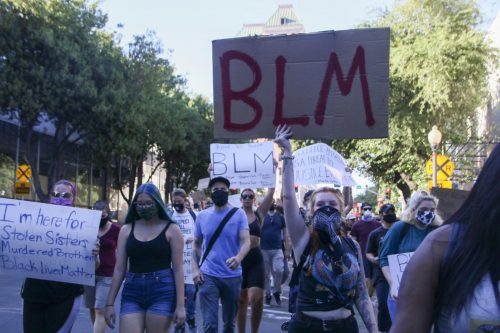
If the LRCCD expects to keep peace within the district they must listen to the call-outs of the BLM movement and radically change the idea of campus policing. Sides have been chosen between the people and those in power, blood has been spilled and damage has already been done.
“George Floyd’s violent death was a breaking point — an all too familiar reminder that, for Black people, law enforcement doesn’t protect or save our lives. They often threaten and take them,” BLM’s website says.
Schools across the country including Sacramento Unified School District, whose contract with police ended on June 30 according to the Sacramento Bee, have chosen to part ways with local police departments. However, the LRPD is an independent police department and does not have formal relationships with other law enforcement agencies, according to Brian King, LRCCD chancellor.
“Los Rios has an independent police force to protect the safety of our students, faculty and staff,” King said in an email to the Current. “Led by Chief [Lawrence] Savidge, the LRPD has developed training protocols and policies to treat everyone, regardless of race, color, age, gender, religion, sex, gender identity, sexual orientation and disability with the highest level of respect and compassion.”
While the LRPD has experienced some minor budget cuts due to the COVID-19 pandemic, according to Savidge the district currently has no plans to defund or dismantle the police department and they currently sit with a budget of $5.5 million, with an average officer making $84,478 a year.
“The Los Rios Police Department’s mission statement articulates that our department is dedicated to crime prevention, the protection of life and property and the preservation of peace and order,” Savidge said in an email to the Current. “We are committed to promoting a safe, secure environment that facilitates academic achievement and personal enrichment.”
While the district will not be defunding the police, according to Scott Crow, American River College public information officer, the college has plans to implement new classes and cultural centers to highlight Black culture.
“The college has developed and is in the process of implementing the ARC Institutional Equity Plan and the recommendations adopted from the work of the Disproportionate Impact Project Teams as an outgrowth of ARC’s stated commitment to social justice and equity,” Crow said. “Among those recommendations is the creation of the Office of Equity and Inclusion, and Black and African-American Cultural Center, among many other efforts to close the opportunity gap for our students of color.”
Crow said that more changes in classes and curriculum are yet to come.
“Curriculum updates are an ongoing and interactive process. Faculty have been engaged in conversations regarding changes to curriculum, and these changes will move through our process led by the Curriculum Committee,” Crow said.
King emphasized that the district is aware that changes are needed not only in the form of new classes but also changes in the content and perspectives focused on in the classes as well.
“Robust conversations are taking place about not only new classes but also infusing our existing courses with higher levels of cultural competency,” King said. “We cannot rely on new classes alone to focus on the history and culture of Black people, though new classes may be necessary and appropriate.”
Crow added the already available transfer degree in Social Justice Studies: Race and Ethnicity, and the training programs for faculty that include “a plethora of action-oriented equity workshops.”
According to King, Los Rios participates as a member in several organizations fighting for the rights of people of color including the Urban League, the Sacramento Black Chamber of Commerce, the Sacramento Hispanic Chamber of Commerce and the Sacramento Asian Pacific Chamber of Commerce.
“Sacramento City College hosts the annual region-wide MLK march, and each of our colleges engage in a broad array of activities to support students, faculty and staff of color,” King said.
While cultural representation, promoting diversity, and changes in the curriculum are all great additions to our learning environment, they are not enough to create a truly equitable system for all students, especially those of color.
This problem is currently being addressed with the use of implicit bias training. The LRPD officers have been receiving implicit bias training since June 2019, and according to Savidge, are continuing to receive other training as well on a monthly basis.
“Our officers are receiving monthly training on social issues that affect the diverse population that our department serves,” Savidge said. “This includes training on de-escalation, social justice, implicit bias, LGBTQ+, Latino and immigrant issues, autistic and deaf members, homeless, mental health and crisis intervention.”
While breaking down racist and otherwise problematic ideology is a good idea in theory, in practice it has been proven to not work and in fact, can even exacerbate the problem.
According to Frank Dobbin and Alexandra Kalev, authors of the Harvard study, “Why Doesn’t Diversity Training Work?”, there is no proof that any amount of training can actually change a person’s mind about stereotypes.
“Field and laboratory studies find that asking people to suppress stereotypes tends to reinforce them — making them more cognitively accessible to people,” Dobbin and Kalev say.
Imagine being asked not to think about ice cream on a monthly or even daily basis. This reminder to avoid it might actually increase the desire to think about it and lust after it. The same ideology can be applied to asking those who are racist, implicitly or explicitly, to stop. The thrill and rush of superiority consumes them and only fuels their passion for the hatred of others.
“Job autonomy research finds that people resist external controls on their thoughts and behavior and perform poorly in their jobs when they lack autonomy,” Dobbin and Kalev say. “Self-determination research shows that when organizations frame motivation for pursuing a goal as originating internally, commitment rises, but when they frame motivation as originating externally, rebellion increases.”
These changes to human morality cannot come from outside sources. To truly affect change we must dismantle the historical structures and platforms that propagate these racist ideologies and practices.
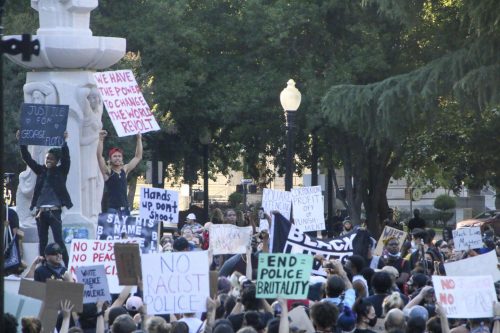
The police themselves are seen by many as a symbol of racism and hate. The district should maintain a standard of not allowing groups that have engaged in so much targeted racial violence to occupy power positions on campus.
Los Rios must understand that the system as it is needs more than just a little reform and bias training. If there is no possibility for the LRPD to be abolished it must be changed entirely to reflect the population it serves and not intimidate the students of the LRCCD.
Gun-toting strong-men and women in black-clad outfits, with utility belts full of weapons and restraints, do not promote a safe or equitable environment for all students.
“We call for an end to the systemic racism that allows this culture of corruption to go unchecked and our lives to be taken,” BLM’s website says. “We call for a national defunding of police. We demand investment in our communities and the resources to ensure Black people not only survive, but thrive.”
The district claims that the most important thing they can do is to continue working to address the inherent gaps in outcome for students of color and continue to provide space for conversations about both racism and the need to be anti-racist.
“We will make sure that the fight against racism remains a top priority even if the spotlight on the most recent tragedies moves to other issues,” King said. “In addition to having courageous conversations, we will also take courageous actions when we see opportunities to address structural barriers that have a harmful impact on students of color.”
While it seems King’s heart is in the right place, the district must begin to look at the LRPD as a structural barrier with a harmful impact on students of color to create true equity and promote a sense of comfort and security for all students.
“We will move quickly to identify existing policies and practices that harm Black people and make needed changes,” King said. “Finally, we will continue to engage faculty to address persistent gaps in outcomes for Black students and all students of color.”
The district must not have listened to the cries of thousands marching in the streets of Sacramento screaming, “Defund the police, invest in community!” as they have not moved quickly to change their existing policies and practices in regards to the function of the police force on campus.
“Enough is enough. Our pain, our cries, and our need to be seen and heard resonate throughout this entire country,” BLM’s website says. “We demand acknowledgment and accountability for the devaluation and dehumanization of Black life at the hands of the police. We call for radical, sustainable solutions that affirm the prosperity of Black lives.”
What will the LRCCD do when the protests come to our campuses? Will they call us peaceful protestors or violent rioters?
We saw the police pushing people to the ground, tear-gassing children and shooting people in the face with rubber bullets. We saw the national guard with their M-4 assault rifles posted six feet apart guarding buildings around Sacramento. We saw what it means to protect property and preserve “order”, and we are scared.
Nick Daily, ARC Dean of Equity and Inclusion, declined to comment on whether he agreed with the choices of the district to not defund the police and said he doesn’t know what to say to people who feel that the existence of the LRPD is inequitable, but instead offered hope and inspiration.
“I am a big believer in imagining the world that we want to see and then doing what we can to get to that world,” Daily said. “Because there’s no way for us to reach that world if we can’t see it; if we can’t see past the barriers.”


